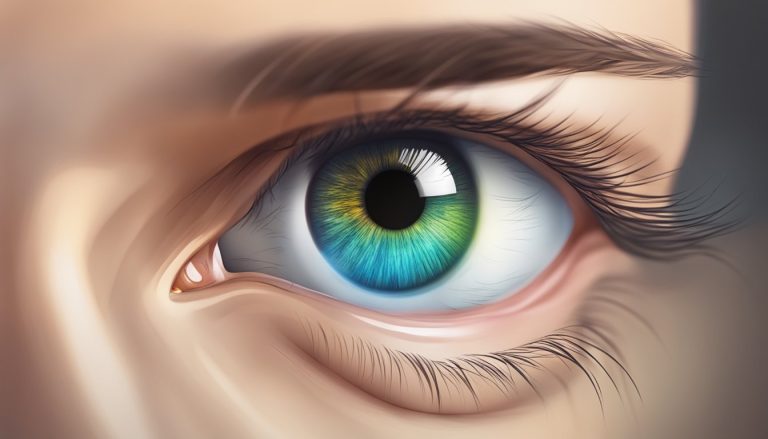Sudden Feeling of Eyes Crossing: Causes and Treatment
Sudden Feeling of Eyes Crossing: Causes and Treatment
If you’ve ever experienced a sudden feeling that your eyes are crossing, you may be wondering what caused it and if it’s a cause for concern. This sensation can be alarming, but it’s important to understand that there are many potential causes, ranging from benign to serious.
In this article, we’ll explore some of the possible reasons why you may be experiencing a sudden feeling of crossed eyes, and what you can do about it.
Understanding Strabismus and Vision Challenges
One possible cause of a sudden feeling of crossed eyes is a condition called strabismus. Strabismus occurs when the eyes are not properly aligned, causing one eye to look in a different direction than the other. This can result in double vision, blurred vision, and difficulty focusing.
Strabismus can be caused by a variety of factors, including genetics, eye muscle problems, and nerve disorders. If you suspect that you may have strabismus, it’s important to see an eye doctor for a proper diagnosis and treatment plan.
Treatment and Management
The treatment for a sudden feeling of crossed eyes will depend on the underlying cause. If the cause is strabismus, treatment may include glasses, eye exercises, or surgery.
Other potential causes of crossed eyes include migraines, neurological conditions, and certain medications. If you’re experiencing a sudden feeling of crossed eyes, it’s important to see a doctor to determine the underlying cause and develop an appropriate treatment plan.
With proper diagnosis and treatment, many people are able to manage or even eliminate this symptom.
Key Takeaways
- A sudden feeling of crossed eyes can be caused by a variety of factors, including strabismus, migraines, and neurological conditions.
- If you suspect that you may have strabismus, it’s important to see an eye doctor for a proper diagnosis and treatment plan.
- Treatment for a sudden feeling of crossed eyes will depend on the underlying cause, but may include glasses, eye exercises, or surgery.
Understanding Strabismus and Vision Challenges
If you suddenly feel like your eyes are crossing, it could be a sign of strabismus, a condition where one or both eyes are misaligned. Strabismus can cause vision challenges, including double vision, lazy eye (amblyopia), and depth perception issues.
Causes of Strabismus
Strabismus can be caused by various factors, such as problems with the brain, eye muscles, or nerves that control the eye muscles. Medical conditions like brain tumors, head injuries, diabetes, premature birth, Down syndrome, and thyroid disease can also contribute to the development of strabismus.
Types of Strabismus
There are several types of strabismus, including esotropia (inward turning of the eye), exotropia (outward turning of the eye), hypertropia (upward turning of the eye), and hypotropia (downward turning of the eye). Strabismus can also be intermittent (occurring occasionally) or constant (occurring all the time).
Symptoms and Diagnosis
Symptoms of strabismus include misaligned eyes, double vision, and depth perception issues. If you suspect you have strabismus, your eye doctor can perform a corneal light reflex test and check your visual acuity to diagnose the condition.
It’s important to seek treatment for strabismus to prevent vision loss and other complications.
Treatment options include glasses, patching, eye exercises, medication, and surgery. Adult strabismus is also treatable, so don’t hesitate to seek help if you’re experiencing vision challenges.
Remember to visit your eye doctor regularly to maintain good eye health and catch any vision problems early.
Treatment and Management
If you are experiencing sudden crossed eyes, you should seek medical attention from an ophthalmologist or optometrist.
Treatment for strabismus varies depending on the cause and severity of the condition.
Non-Surgical Interventions
In some cases, non-surgical interventions may be effective in treating strabismus. These can include the use of glasses or contact lenses to correct refractive errors, prisms to improve eye alignment, and vision therapy to improve eye muscle control.
Eye exercises and patching may also be recommended to improve eye coordination.
Surgical Options
If non-surgical interventions are not effective, your doctor may recommend strabismus surgery. This surgery involves adjusting the muscles that control eye movement to improve alignment.
Botox injections may also be used to temporarily relax specific eye muscles and improve alignment. It is important to discuss the risks and benefits of surgery with your doctor before making a decision.
Living with Strabismus
If you have been diagnosed with strabismus, there are steps you can take to manage the condition.
Regular eye exams with an ophthalmologist or optometrist can help monitor the condition and ensure that your corrective lenses are up to date.
It is also important to maintain good eye care habits, such as wearing protective eyewear and taking breaks from activities that require intense focus.
In some cases, underlying conditions such as cerebral palsy or Graves’ disease may contribute to the development of strabismus. If you have been diagnosed with one of these conditions, it is important to work closely with your doctor to manage your symptoms and prevent complications.
Frequently Asked Questions
What can trigger a sudden onset of strabismus in adults?
Sudden onset of strabismus in adults can be caused by various factors, including head trauma, stroke, or a neurological disorder. In some cases, it can also be triggered by eye muscle problems or a change in the refractive error of the eyes.
If you experience sudden onset of strabismus, it is important to seek medical attention to determine the underlying cause.
How does fatigue affect eye alignment and cause crossing?
Fatigue can affect eye alignment and cause crossing because when you are tired, your eye muscles may not work properly, leading to misalignment of the eyes. This can cause double vision, which can be a sign of strabismus.
Taking breaks to rest your eyes and getting enough sleep can help prevent eye fatigue and reduce the risk of eye crossing.
What are the underlying conditions that lead to eyes crossing without warning?
There are various underlying conditions that can lead to eyes crossing without warning, including neurological disorders, head injuries, and Graves’ disease. In some cases, it can also be caused by a misalignment of the eye muscles or a change in the refractive error of the eyes.
It is important to seek medical attention if you experience sudden onset of eye crossing to determine the underlying cause.
Is experiencing dizziness alongside involuntary eye crossing a sign of a serious condition?
Experiencing dizziness alongside involuntary eye crossing can be a sign of a serious condition, such as a stroke or a neurological disorder.
If you experience these symptoms, it is important to seek medical attention immediately to determine the underlying cause and receive appropriate treatment.
How can adults correct unexpected cross-eye issues?
The treatment for unexpected cross-eye issues depends on the underlying cause. In some cases, eye exercises or vision therapy may be recommended to strengthen the eye muscles and improve eye alignment. In other cases, surgery may be necessary to correct the misalignment of the eyes.
Are there specific treatments for sudden double vision due to eyes crossing?
The treatment for sudden double vision due to eyes crossing depends on the underlying cause. In some cases, wearing corrective lenses or using prisms may help improve vision and reduce double vision.
In other cases, surgery may be necessary to correct the misalignment of the eyes. It is important to seek medical attention to determine the underlying cause and receive appropriate treatment.




